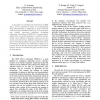Free Online Productivity Tools
i2Speak
i2Symbol
i2OCR
iTex2Img
iWeb2Print
iWeb2Shot
i2Type
iPdf2Split
iPdf2Merge
i2Bopomofo
i2Arabic
i2Style
i2Image
i2PDF
iLatex2Rtf
Sci2ools
ICDCSW
2003
IEEE
2003
IEEE
IEEE 802.11 Ad Hoc Networks: Performance Measurements
In this paper we investigate the performance of IEEE 802.11 ad hoc networks by means of an experimental study. Measurements on IEEE 802.11 ad hoc networks confirm previous simulative results (e.g., TCP connections may actually experience significant throughput unfairness). The analysis of IEEE 802.11b reveals several aspects that are usually neglected in simulative studies. Firstly, since different transmission rates are used for control and data frames, different transmission ranges and carrier-sensing ranges may exist at the same time in the network. In addition, the transmission ranges are in practice much shorter than usually assumed in simulative analysis, and are not constant but highly variable, even in the same session.
Ad Hoc Networks | Distributed And Parallel Computing | ICDCSW 2003 | IEEE 802.11 Ad | Transmission Ranges |
| Added | 04 Jul 2010 |
| Updated | 04 Jul 2010 |
| Type | Conference |
| Year | 2003 |
| Where | ICDCSW |
| Authors | Giuseppe Anastasi, Eleonora Borgia, Marco Conti, Enrico Gregori |
Comments (0)

